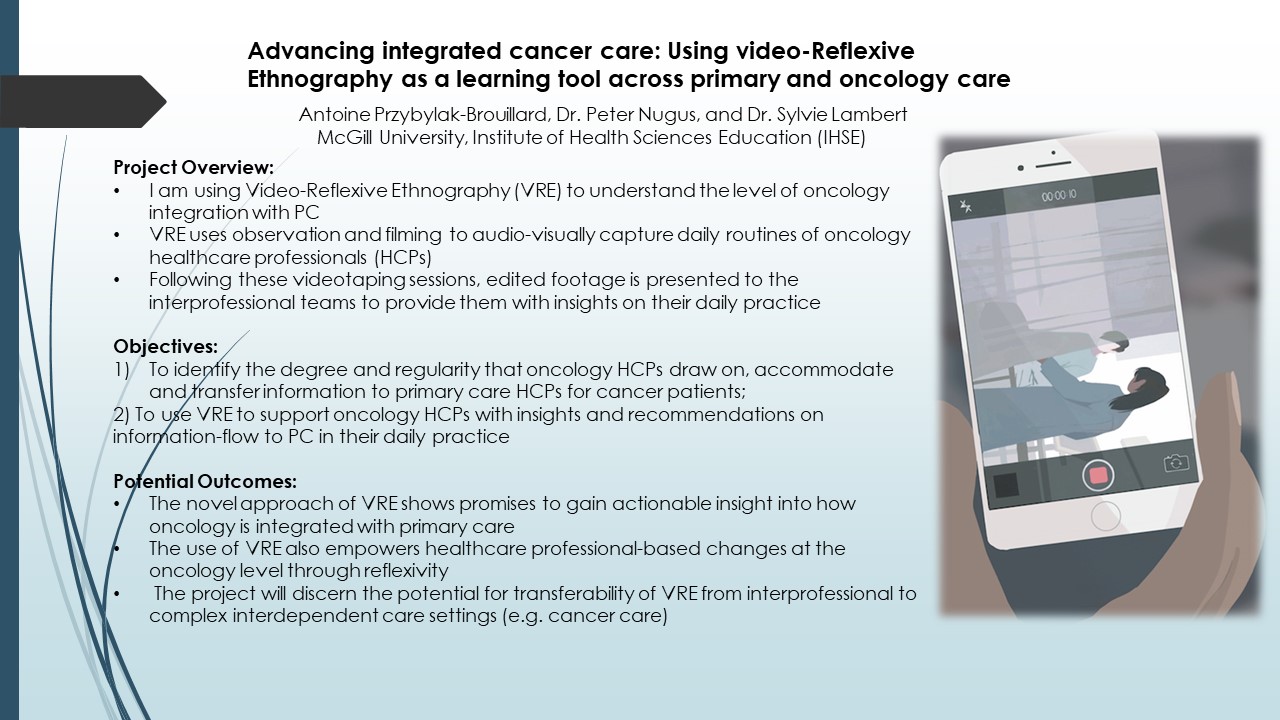SRFP006: Advancing integrated cancer care: Using video-Reflexive Ethnography as a learning tool across primary and oncology care
Antoine Przybylak-Brouillard, BA, MA; Peter Nugus, PhD, BA, MA, MEd
Abstract
Context: Primary care (PC) is a central point of integration across care sectors. Coordination of care across sectors is a major weakness of developed health systems. Cancer in PC is particularly challenging to identify due to its radical variations of symptom manifestations. Some studies have researched the integration of PC with other sectors through patient or HCP perspectives in interviews and surveys, and outcome indicators of quality of care. Still, the crucial mid-point is the situated processes of deciding when and how to transfer information from oncology to PC. An ethnographic approach can do this. Furthermore, there have been no studies that apply a video-reflexive ethnography (VRE) intervention to support oncology healthcare providers (HCPs) to collectively learn how to integrate primary care in their daily clinical decisions and planning.
Objectives:
1. To identify the degree to which oncology HCPs draw on, accommodate and transfer information to primary care HCPs for cancer patients;
2. To document educational strategies, that VRE exposes, that support oncology HCPs to enhance information flow to PC in their daily practice.
Study Design: This project is a two-phase intervention-based study centred on the participatory application of VRE.
Setting or Dataset: The study will be undertaken in two separate hospital oncology units.
Population Studied: HCPs of interdisciplinary cancer care teams who discharge patients to primary care.
Intervention/Instrument (as pertinent): Video-Reflexive Ethnography (VRE) is used to understand the level of oncology integration with PC, using observation and filming to audio-visually capture daily routines of HCPs. Following videotaping sessions, further video data is analyzed from presentation of discussion during edited footage presented to the interprofessional teams.
Results or Anticipated Results: The study shows whether or how VRE can enhance information flow from acute to PC, especially for cancer patients.
Conclusions: The study will show how VRE might support integration of care across primary care and hospital-based care.
Objectives:
1. To identify the degree to which oncology HCPs draw on, accommodate and transfer information to primary care HCPs for cancer patients;
2. To document educational strategies, that VRE exposes, that support oncology HCPs to enhance information flow to PC in their daily practice.
Study Design: This project is a two-phase intervention-based study centred on the participatory application of VRE.
Setting or Dataset: The study will be undertaken in two separate hospital oncology units.
Population Studied: HCPs of interdisciplinary cancer care teams who discharge patients to primary care.
Intervention/Instrument (as pertinent): Video-Reflexive Ethnography (VRE) is used to understand the level of oncology integration with PC, using observation and filming to audio-visually capture daily routines of HCPs. Following videotaping sessions, further video data is analyzed from presentation of discussion during edited footage presented to the interprofessional teams.
Results or Anticipated Results: The study shows whether or how VRE can enhance information flow from acute to PC, especially for cancer patients.
Conclusions: The study will show how VRE might support integration of care across primary care and hospital-based care.
